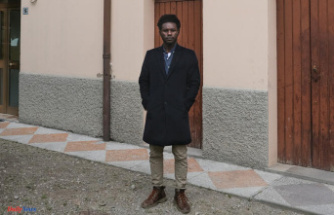Chef's whites look professional on the outside, but when worn, they can be ill-fitting and feel hot, problems Jenny Goodman and Alex McCrery set out to fix in 2012. Their remedy was Tilit, a line of functional, fashionable cooking clothes designed on the Lower East Side, produced in Midtown and worn at more than 200 restaurants and hotels in New York City and beyond. The name is a play on the word utility; while some of the styles look like weekendwear, they are work clothes engineered for busy chefs.
The husband-and-wife duo, veterans of the restaurant industry, started out selling waxed-cotton aprons and stain-resistant coats to individual chefs out of Tilit's showroom and on its website. The prices cover the cost of fabricating in New York while keeping the clothes affordable. Shirts and coats range from $45 to $115, and Tilit's standard aprons are $85.
McCrery, the designer, used to be a chef. Throughout his career, he hated the way the typical whites fit. When he left restaurants to become a private chef, wearing his formal uniform in a home kitchen or on the street made him feel ridiculous.
article continues below advertisement Focal points NAME TilitINDUSTRY Apparel
FOUNDER Jenny Goodman, COO; Alex McCrery, designer
LAUNCHED 2012
LOCATION Lower East Side and the Garment District
MAJOR INVESTORS None
REVENUE More than $1 million
ANNUAL GROWTH RATE 50%
EMPLOYEES 13, soon to be 14
WEBSITE tilitnyc.com
"I thought that at the height of my career I should feel proud of what I was doing and that should be reflected in the clothes," he said. Tilit's styles take cues from current trends, but they are lightweight in order to keep cooks cool. They're also stain-repellent and able to withstand many washes.
Seven months into selling to individuals, Tilit received an order for custom aprons from the chefs at Contra, a restaurant on the Lower East Side. "That's when we thought, Oh, we should be selling direct to restaurants," said Goodman.
"New York has 20,000 restaurants," added McCrery. "There's a lot of potential."
Style matters
More restaurants invested in Tilit's clothes for their functionality and style. "The restaurant world is moving more and more to open kitchens," said Gil Avital, general manager for Seamus Mullen's Tertulia and El Colmado outposts, where staff including the waiters and the sous chefs wear the company's custom aprons and jackets. "When you are working in an open kitchen, you need to look presentable and fashionable. It's part of the look of the restaurant."
Although men make up the majority of the culinary workforce, Tilit offers a line tailored to women. "In the past women's coats were generally just a smaller men's coat or they were really bad pink polyester numbers," said McCrery.
Among the company's competitors are several apron makers that sprung up around the same time for the same reasons. What distinguishes Tilit, however, is its attention to seasonal fashion trends, McCrery said. And his industry connections have helped him capture trendy restaurants such as EmpellÓn Cocina in the East Village and Soho House locations on both sides of the Atlantic. Industry leaders adopted the clothing almost as soon as they heard about it. "When Alex was starting out, in an interview someone asked him who he'd like to see wearing his chef jackets, and he mentioned me!" Mullen said. "I've been wearing Tilit exclusively in the kitchen ever since."
The company has begun to work with hotels, outfitting housekeeping and maintenance teams at The Standard and the 1 Hotel Brooklyn Bridge. Tilit is also pushing into streetwear, first with a butcher's coat and next with a worker's style.
Photo: Buck Ennis Tilit started out waxed-cotton aprons and chefs coats, but its line includes uniforms for other hospitality brands, and even streetwear.Just under half of Tilit's revenue now comes from business sales; the rest is from direct-to-consumer e-commerce. Pants, aprons and chef shirts are the company's best-sellers, shipping out at a rate of 500 units a month and pushing total revenue to well above $1 million, up 50% in the 12-month period that ended in October. Besides the $100,000 they won in a 2015 small-business contest run by Chase, Goodman and McCrery have no outside investors. The winnings allowed them to buy more supplies so customers didn't have to wait six weeks for popular items. "We were losing out on sales," said Goodman. Tilit now has 13 employees and is looking to hire one more.
To make the clothes in the city, Goodman and McCrery say they spend two and a half times what it would cost to manufacture overseas. By selling directly to customers, they've been able to sustain margins at about 55%. The pair is committed to staying here for convenience, quality control—it's easy to check on items at a local factory—and shorter lead times. Plus, they say, locavore chefs like knowing their uniforms come from nearby.
"Consumers and chefs want to know where food is from," said McCrery. "Wanting to know where clothes are from goes along with that."
Chef's whites look professional on the outside, but when worn, they can be ill-fitting and feel hot, problems Jenny Goodman and Alex McCrery set out to fix in 2012. Their remedy was Tilit, a line of functional, fashionable cooking clothes designed on the Lower East Side, produced in Midtown and worn at more than 200 restaurants and hotels in New York City and beyond. The name is a play on the word utility; while some of the styles look like weekendwear, they are work clothes engineered for busy chefs.
The husband-and-wife duo, veterans of the restaurant industry, started out selling waxed-cotton aprons and stain-resistant coats to individual chefs out of Tilit's showroom and on its website. The prices cover the cost of fabricating in New York while keeping the clothes affordable. Shirts and coats range from $45 to $115, and Tilit's standard aprons are $85.
McCrery, the designer, used to be a chef. Throughout his career, he hated the way the typical whites fit. When he left restaurants to become a private chef, wearing his formal uniform in a home kitchen or on the street made him feel ridiculous.
"I thought that at the height of my career I should feel proud of what I was doing and that should be reflected in the clothes," he said. Tilit's styles take cues from current trends, but they are lightweight in order to keep cooks cool. They're also stain-repellent and able to withstand many washes.
Seven months into selling to individuals, Tilit received an order for custom aprons from the chefs at Contra, a restaurant on the Lower East Side. "That's when we thought, Oh, we should be selling direct to restaurants," said Goodman.
"New York has 20,000 restaurants," added McCrery. "There's a lot of potential."
Style matters
More restaurants invested in Tilit's clothes for their functionality and style. "The restaurant world is moving more and more to open kitchens," said Gil Avital, general manager for Seamus Mullen's Tertulia and El Colmado outposts, where staff including the waiters and the sous chefs wear the company's custom aprons and jackets. "When you are working in an open kitchen, you need to look presentable and fashionable. It's part of the look of the restaurant."
Although men make up the majority of the culinary workforce, Tilit offers a line tailored to women. "In the past women's coats were generally just a smaller men's coat or they were really bad pink polyester numbers," said McCrery.
Among the company's competitors are several apron makers that sprung up around the same time for the same reasons. What distinguishes Tilit, however, is its attention to seasonal fashion trends, McCrery said. And his industry connections have helped him capture trendy restaurants such as EmpellÓn Cocina in the East Village and Soho House locations on both sides of the Atlantic. Industry leaders adopted the clothing almost as soon as they heard about it. "When Alex was starting out, in an interview someone asked him who he'd like to see wearing his chef jackets, and he mentioned me!" Mullen said. "I've been wearing Tilit exclusively in the kitchen ever since."
The company has begun to work with hotels, outfitting housekeeping and maintenance teams at The Standard and the 1 Hotel Brooklyn Bridge. Tilit is also pushing into streetwear, first with a butcher's coat and next with a worker's style.
Just under half of Tilit's revenue now comes from business sales; the rest is from direct-to-consumer e-commerce. Pants, aprons and chef shirts are the company's best-sellers, shipping out at a rate of 500 units a month and pushing total revenue to well above $1 million, up 50% in the 12-month period that ended in October. Besides the $100,000 they won in a 2015 small-business contest run by Chase, Goodman and McCrery have no outside investors. The winnings allowed them to buy more supplies so customers didn't have to wait six weeks for popular items. "We were losing out on sales," said Goodman. Tilit now has 13 employees and is looking to hire one more.
To make the clothes in the city, Goodman and McCrery say they spend two and a half times what it would cost to manufacture overseas. By selling directly to customers, they've been able to sustain margins at about 55%. The pair is committed to staying here for convenience, quality control—it's easy to check on items at a local factory—and shorter lead times. Plus, they say, locavore chefs like knowing their uniforms come from nearby.
"Consumers and chefs want to know where food is from," said McCrery. "Wanting to know where clothes are from goes along with that."
A version of this article appears in the February 27, 2017, print issue of Crain's New York Business.
Sign up for our FREE daily email newsletter. A summary of the day's top business and political headlines from the newsroom of Crain's New York Business.
More Newsletters ›
Our editors found this article on this site using Google and regenerated it for our readers.












